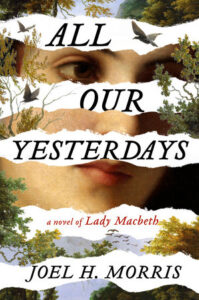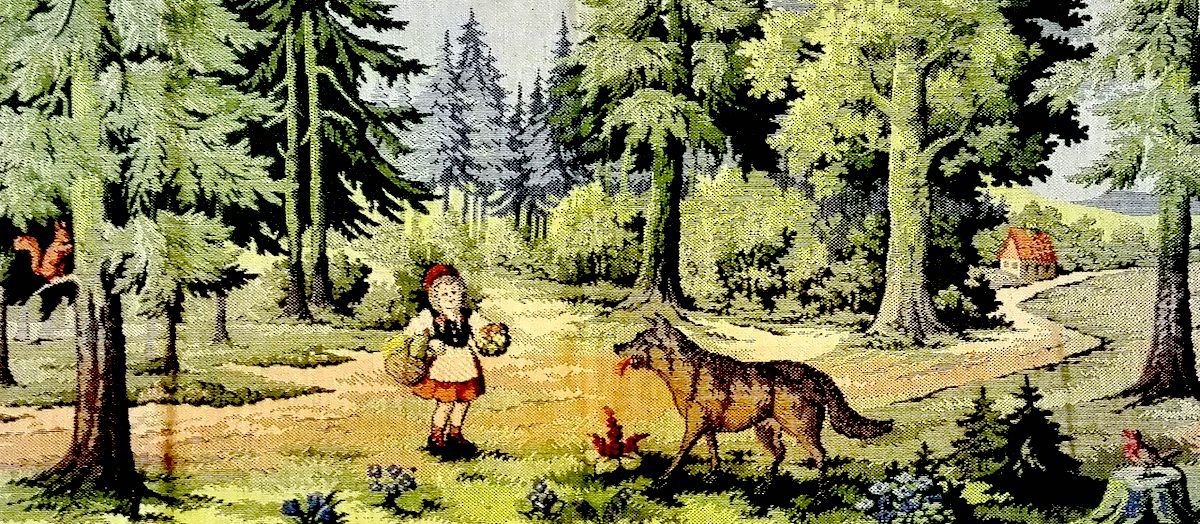From Red Riding Hood to Beowulf: On the Essential Role of Literary Reimaginings
“To tell such tales again is to tell them for the first time.”
Deep in the forest, an old woman sits in her cottage by the fire. She complains that her daughter is not raising her granddaughter correctly, not teaching the girl “the facts of life.” There’s a danger in such ignorance. After all, the girl could be walking through the woods that very minute. The trees are thick, and wolves are waiting.
The delight in Nalo Hopkinson’s story, “Riding the Red,” comes in realizing that this old woman is Little Red Riding Hood. Or a version of her who, as a girl, also made her own journey through the woods. She encountered the wolf, and now she sits by her fire as the cycle repeats. But rather than a story of childhood disobedience, this grandmother, full of experience, full of life even as it fades from her, delivers a twist: she longs to relive that moment of innocence lost.
As grandmother/Red, the old woman can do something the “original” version cannot: she can covey a spectrum of experience that makes us rethink the meaning of the tale: that her youthful straying from the path was the most powerful and pleasurable thing in her life. If only she could relive that chance encounter with the wolf. If only she hadn’t married the pleasant-enough woodsman, hadn’t raised her own daughter to avoid wolves. The hope of the story is that the elderly Red’s granddaughter will get to experience that significant “dance with wolfie” and all of its metaphorical awakenings and implications.
The goal of re-imaginings is not faithfulness, but rather transformation, accounting for what is unsaid or not fully explored.My own novel, All Our Yesterdays, takes its inspiration from Macbeth to imagine Shakespeare’s characters in the decade leading up to the beginning of the play. The challenges of writing from Lady Macbeth’s perspective and reimagining her life by balancing history with her portrayal in the tragedy made me consider the potential and the purpose of rethinking—and rewriting—old tales.
The proliferation of literary retellings—narrative re-imaginings that guide us through a story we know, or thought we knew, telling them from another perspective—says something about our current moment. For one thing, they allow us, in the age of “multi-” and “metaverses,” to experience the world from a never-ending selection of perspectives and possible outcomes.
Even more importantly, they celebrate of a multitude of voices—voices that were marginalized by the culture and time in which their original stories appear. A 1970’s retelling of Red Riding Hood in Angela Carter’s “The Company of Wolves,” for instance, has Red taking charge of her encounter with the wolf: “The girl burst out laughing; she knew she was nobody’s meat.” She seduces him.
Envisioning Red Riding Hood from a more feminist point of view, as the one bedding the wolf, carries a certain satisfaction. It turns the power dynamic on its head. But Carter does not simply offer an alternate version of events in which Red Riding Hood is in control. She also places the psychological, social, and sexual insinuations directly on the page, exposing and confronting head-on what was formerly guessed at, suppressed.
For this reason, re-imaginings are not merely alternate perspectives that give voice to those fictional characters who were once voiceless. They do indeed offer that—such as when Margaret Atwood in The Penelopiad provides a crucial female viewpoint (or viewpoints) through Penelope’s voice and through the chorus of her maids who are hanged when Odysseus returns to Ithaca. But Atwood deliberately offers only some clarity into Penelope’s thinking; Penelope as a narrator is flawed, and by the end of the novel we wonder whether she is actually a victim of her husband’s abandonment or whether she is complicit in the death of innocents.
In her introduction to The Penelopiad, Atwood says she was drawn to this particular tale because “the story as told in The Odyssey doesn’t hold water: there are too many inconsistencies.” She is haunted by the story of the hanged maids “and, in The Penelopiad, so is Penelope herself.” The maids, singing out in their chorus, calls the true horrors of this retelling to the surface: through them, we experience the story rewoven into an odyssey of the psyche, of class, of gender, of otherness, of everything that might haunt us about the original.
The best re-imagined stories address what is inconsistent about the original text and make it unmissable. An inconsistency in Red Riding Hood, for instance, is not just a tired trope of sexual repression—easy enough to accept, to dismiss. But in the hands of Angela Carter and Nalo Hopkinson, we cannot look away, cannot do anything except contend with a girl’s pleasure and guilt comingling simultaneously and so complexly. We must contend with fictional characters at their most human.
Percival Everett’s latest novel, James, gives voice to a remarkable man and to a history of inconsistencies and injustices by breaking open the hidden life of Miss Watson’s slave in Mark Twain’s Adventures of Huckleberry Finn. Everett’s eponymous character is a slave to those who possess his body, a slave in the eyes of the law. But this slavery belies the freedom teeming in his mind. His secret identity—announced from the novel’s start—is that he is “James,” a lover of books, of philosophy. James must square his spiritual and mental freedom with the horrors of his bonds.
He becomes a master of performance who must enact the role of slave—of “Jim”—in order to placate and survive the cruelty and expectations of Whites around him. He even teaches his daughter the art of “slave” speech, modifying language to avoid suspicions of her own intellectual freedom and power. In fact, every slave in this novel is acting the role expected of them, only speaking freely and unaffectedly to one another as soon as the mask can be dropped. And, as he and Huck make their way down the Mississippi and grapple with the various forms of racial hegemonies they encounter, Jim/James finds it increasingly difficult to stay “in character,” as he puts it.
Twain conceived his own novel as a reimagining of The Adventures of Tom Sawyer told from Huck’s perspective, giving voice to the son of the town drunk, showing an America from the perspective of its lower White classes. But like Carter, like Atwood, Everett does not use the “Jim/James” device to merely give his character a voice. Instead, James becomes an author not only of his own story, but also of the stories the Whites tell themselves: destructive lies about superiority and power.
James writes of the inconsistencies and the horrors of the life denied him in a world built around these lies. His denied life includes not knowing what might happen to his wife and child once he is on the run. It is no accident that James is visited in his dreams by the English philosopher John Locke—exponent of the idea that life, liberty, and property are the rights of all (read: some). In other words, James shows the ironies of philosophical idealism through a character to whom those ideals are not allowed.
As long as we are unified by shared stories, re-imagining those stories will remain an important human endeavor.When I was in high school, John Gardner’s Grendel was still a popular version of the literary reimagining. My adolescent mind was blown away by the idea of telling the epic of Beowulf from the monster’s perspective, and of the heady philosophy it addressed. My teacher, Mr. Anderson, himself an inspiration, had us read a letter Gardner wrote to an English teacher, Susie West, and her students a generation before. At the time, the letter was a bad photocopy, probably passed from school to school, English teacher to English teacher, copied, copied again. It was like a secret message, a window into an author’s mind that we so rarely have access to. Now you can readily find it online.
At times, Gardner takes a harsh tone with the students who are merely asking him well-meaning questions—at one point he says they read “too innocently; too much like children” (which, yes, they are). But he also presents what he sees as the author’s “method,” which “is not to argue for a single position… but rather to explore, with all the care and wisdom he’s capable of mustering, the various implications, contributing factors, etc., that must be considered when any serious philosophical question is raised.” Grendel does just that by pushing back against a certain nihilism, by questioning the use of storytelling and its central role in all our lives. Re-imaginings, for Gardner, raise philosophical questions.
To raise such questions, the goal of re-imaginings is not faithfulness, but rather transformation, accounting for what is unsaid or not fully explored because the times call for it. This is not because the original works might be problematic—they often exhibit the genius and tenor of an age—but because they cannot always address what Atwood says “doesn’t hold water,” at least not to readers who have drifted away culturally, socially, and politically from the day in which they were written. James Joyce modernized Ulysses as a single-day’s odyssey in a way that could not have been written until that moment.
And Barbara Kingsolver’s Demon Copperhead is a sensation in a way that would give Charles Dickens a run for his money. Shakespeare himself not only took long-told histories and legends and reworked them for the stage, but he thoroughly modernized them, reweaving the lore of a clever fool named Amleth into a young man who feels every splinter of existence in the marrow of his bones: Hamlet. Such stories are ripe for reinvention—the originals are ciphers, archetypes, shadows, but in the hands of a Shakespeare they are transformed into masterpieces that explore the human psyche.
As long as we are unified by shared stories, re-imagining those stories will remain an important human endeavor. The popularity of literary “re-imaginings”—developing and expanding the worlds of already existing stories—is not to retell them simply to give voiceless characters a voice, or to explore another perspective. It is to acknowledge a lack, a sense of incompletion.
There is simply something missing that needs to be addressed, a problem unsolved, or a problem created in the solving of problems. They return to give Red Riding Hood a true girlhood; they allow a slave named “James” to survive by hiding his personhood by disguising himself as “Jim”—a character who has been denied his humanity. To tell such tales again is to tell them for the first time, to weave a thread in the tapestry of what it means to be human, and so always-ever incomplete.
__________________________________

All Our Yesterdays by Joel H. Morris is available from G.P. Putnam’s Sons, an imprint of Penguin Publishing Group, a division of Penguin Random House, LLC.




















